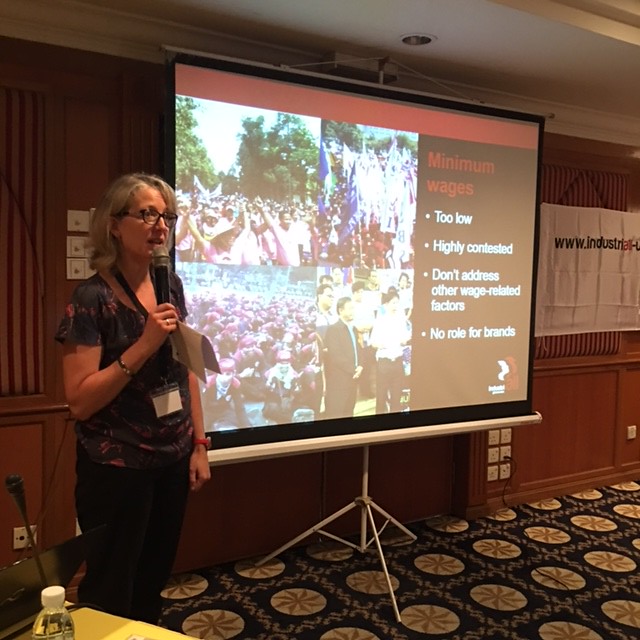3 August, 2016Meeting in Phnom Penh, Cambodia, IndustriALL Global Union affiliates from seven Asian countries discussed how to strengthen their collaboration towards achieving living wages for garment workers in the region.
Supported by FES, the workshop held on 28 and 29 July 2016 provided an opportunity for unions to share the challenges of increasing higher minimum wages, and to discuss the potential for pushing for more effective mechanisms.
Affiliates had common experience that low union density makes achieving higher minimum wages difficult, while non-compliance and lack of effective enforcement of minimum wages are constant problems. But the unions have been campaigning hard on the issue and reported positive developments.
In the Philippines, the living wage is a priority for unions and they are building unity around it. They are using the minimum wage as a benchmark to push for higher wage outcomes in collective bargaining agreements (CBAs) and have formed a national association of minimum wage earners, which enables them to organize many precarious contract and agency workers who can join individually.
Indonesian unions have the goal of increasing the number of items included in the calculation of the minimum wage and to negotiate 40 per cent more CBAs. Following a legislative change to tie the minimum wage rate to inflation and economic growth, they are fighting to get back the right to push for higher increases, as standard percentage increases will cause increasing disparities between regions with different minimum wage rates.
In Myanmar, many disputes and strikes led to the formation of a national minimum wage committee which includes unions, in 2013. Following negotiations, the first minimum wage for Myanmar workers was announced in August 2015. In Cambodia, there is a bloody history of disputation and violence prior to instituting an annual revision of the minimum wage for the garment sector. The unions are currently in the process of analysing a wage survey on living expenses to develop their claims for 2017.
Unions in Bangladesh and Thailand are currently facing specific barriers to mobilizing in support of higher wages. In Bangladesh the last increase to the minimum wage was in 2013 following the Rana Plaza collapse and ensuing labour unrest, but now the security situation following multiple terrorist attacks in Dhaka is making it difficult to campaign. Nevertheless, the unions are trying to reach a common position on a wage demand. In Thailand the unions are campaigning for a higher minimum wage as there has been no increase since 2011, but the current military regime prevents public gatherings of trade unions.
Vietnam is the only country in the region that has an industry-level collective agreement. First negotiated in 2010, the agreement mainly covers state-owned and joint-stock enterprises, but attempts are being made to extend it to more private sector companies. It provides a framework for conditions in the industry and contains conditions, including wages, which are higher than the law and encourages enterprise-level agreements to increase benefits further.
Affiliates agreed that industry level bargaining must be developed in each country as the best means of securing higher wages and better working conditions, in line with the ACT agreement between IndustriALL and leading garment brands. At the same time as pushing for industry bargaining, unions will continue to take a more strategic approach to factory-level CBA negotiation. Several examples were given of how this is being done including:
- Pushing for multi-employer CBAs or sectoral agreements at provincial level (Vietnam)
- Finding out which brands factories are producing for and putting on pressure; using the global framework agreements with Inditex and H&M (Bangladesh)
- Benchmarking CBAs from different companies in the same industry (Philippines, Indonesia)
- Mapping factories which do not yet have a CBA (Myanmar)
- Coordinating bargaining by unions in the same company group, brand or industry base with eventual goal of achieving a single agreement for the group (Thailand, Myanmar, Vietnam)
- Merging unions within the same company (Philippines, Thailand)
- Negotiating regional or zonal multi-employer CBAs (Indonesia).
The meeting was joined by representatives from other trade union organizations active in the region, including ITUC, Solidarity Center and APHEDA, who pledged their continued support to union living wage campaigns.










